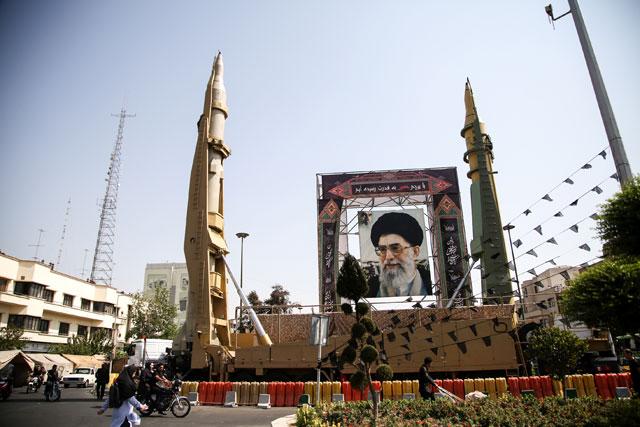You are here
US envoy slams Russia for bid to shield Iran from IAEA inspections
By Reuters - Sep 28,2017 - Last updated at Sep 28,2017

Iranian ballistic missiles Sejjil and Qadr-H are on display at Baharestan Square on the occasion of the Iranian Defence Week in Tehran on Monday (Anadolu Agency photo)
UNITED NATIONS — US Ambassador to the United Nations Nikki Haley on Thursday slammed a bid by Russia to shield Iran from inspections by the United Nations nuclear watchdog relating to a specific section of a landmark 2015 deal restricting Tehran's nuclear activities.
Iran agreed to the nuclear deal with six major powers in exchange for the lifting of sanctions. Compliance with the nuclear restrictions is being verified by the Vienna-based International Atomic Energy Agency (IAEA).
Haley has infuriated Iran by saying the IAEA should widen inspections to include military sites, but diplomats say Russia has been trying to restrict the agency's role by arguing it has no authority to police a broadly worded section of the deal.
"If the Iran nuclear deal is to have any meaning, the parties must have a common understanding of its terms," Haley said in a statement. "It appears that some countries are attempting to shield Iran from even more inspections. Without inspections, the Iran deal is an empty promise."
Haley issued the statement in response to IAEA Director General Yukiya Amano telling Reuters that major powers needed to clarify the disputed section of the deal, which relates to technology that could be used to develop an atom bomb.
That section bans "activities which could contribute to the development of a nuclear explosive device". It lists examples such as using computer models that simulate a nuclear bomb, or designing multi-point, explosive detonation systems.
Unlike many other parts of the deal, the provision, known as Section T, makes no mention of the IAEA or specifics of how it will be verified. Russia says that means the IAEA has no authority over it. Western powers and the agency disagree.
US President Donald Trump has called the Iran nuclear deal — reached by predecessor Barack Obama — "an embarrassment to the United States".
Trump has hinted that he may not recertify the agreement when it comes up for review by a mid-October deadline, in which case the US Congress would have 60 days to decide whether to reimpose sanctions waived under the accord, known officially as the Joint Comprehensive Plan of Action.
Related Articles
VIENNA — The United States and Iran quarreled over how Tehran's nuclear activities should be policed at a meeting of the UN nuclear watchdog
TEHRAN — Iran said Tuesday it had started to restrict some site inspections by the UN nuclear watchdog in response to the US refusal so far
VIENNA — The UN nuclear watchdog's 35-nation board decided on Tuesday to close its investigation into whether Iran once had a secret nuclear












